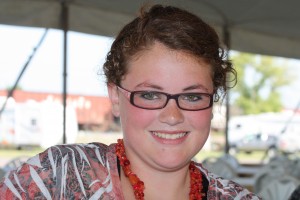 Call me biased, but I think my sister Kaley is one of the coolest kids on the planet. We have nine years in age difference, but it doesn’t seem to matter. We are like two peas in a pod. She is into the same stuff I was as a kid: showing cattle and giving speeches. Yesterday, my mom and my sisters, Kaley and Courtney, went to Sioux Falls, S.D. to attend the 70th Annual Sioux Empire Fair to watch Kaley compete in the 4-H CHARACTER COUNTS! speech contest.
Call me biased, but I think my sister Kaley is one of the coolest kids on the planet. We have nine years in age difference, but it doesn’t seem to matter. We are like two peas in a pod. She is into the same stuff I was as a kid: showing cattle and giving speeches. Yesterday, my mom and my sisters, Kaley and Courtney, went to Sioux Falls, S.D. to attend the 70th Annual Sioux Empire Fair to watch Kaley compete in the 4-H CHARACTER COUNTS! speech contest.
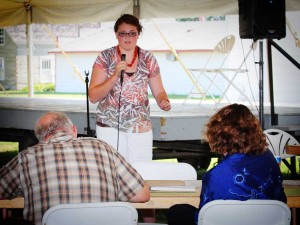 Like any good, older sister, I taped her speech and critiqued her when she was finished. When she didn’t make it to finals, I encouraged her to find areas of improvement and give it a shot next year. For the remainder of the day, we watched the other speeches, attended the free pork luncheon for Ag Appreciation Day and then ditched the fair to head to the mall shopping (it was an all-girl trip, what did you expect?) Anyway, it got me thinking. We get so involved in our day-to-day tasks, chores and errands, do we often slow down to make sure our character is in check? Do you have your respect, responsibility, fairness, caring, trustworthiness and citizenship with you at all times? CHARACTER COUNTS! is a great program to ask ourselves those questions to make sure that we are the best we can be.
Like any good, older sister, I taped her speech and critiqued her when she was finished. When she didn’t make it to finals, I encouraged her to find areas of improvement and give it a shot next year. For the remainder of the day, we watched the other speeches, attended the free pork luncheon for Ag Appreciation Day and then ditched the fair to head to the mall shopping (it was an all-girl trip, what did you expect?) Anyway, it got me thinking. We get so involved in our day-to-day tasks, chores and errands, do we often slow down to make sure our character is in check? Do you have your respect, responsibility, fairness, caring, trustworthiness and citizenship with you at all times? CHARACTER COUNTS! is a great program to ask ourselves those questions to make sure that we are the best we can be.
For more information on this program, link here. And, Kaley…Happy Early Birthday! You’re almost a teenager! The big 13! I’m proud of you, little sister!

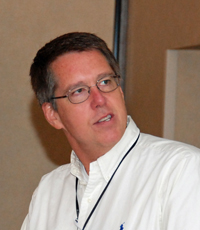
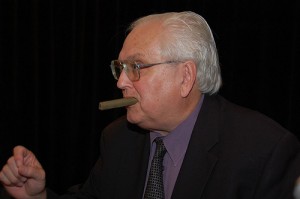 It only seems fitting that a group known for encouraging original thought and innovative ideas for the agriculture industry would pick a man known for his irreverent style and sharp intellect to lead them. Professor of agricultural economics at Kansas State University, Barry Flinchbaugh, is now the Chair of the Board of Trustees of Farm Foundation.
It only seems fitting that a group known for encouraging original thought and innovative ideas for the agriculture industry would pick a man known for his irreverent style and sharp intellect to lead them. Professor of agricultural economics at Kansas State University, Barry Flinchbaugh, is now the Chair of the Board of Trustees of Farm Foundation.  The annual
The annual  The location is beautiful Carolina Beach at the Courtyard Marriott and the weather was beautiful this evening. The event will include a day long business session on Friday featuring the latest in swine health information for producers – and then a day of fun on Saturday for fishers, golfers and beach goers.
The location is beautiful Carolina Beach at the Courtyard Marriott and the weather was beautiful this evening. The event will include a day long business session on Friday featuring the latest in swine health information for producers – and then a day of fun on Saturday for fishers, golfers and beach goers.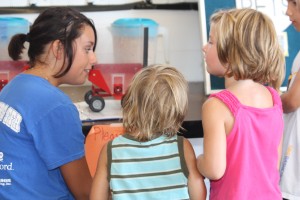
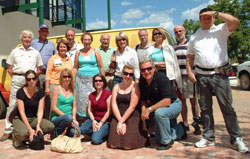 At the conclusion of the IFAJ Congress and Ag Media Summit there were a number of tours.
At the conclusion of the IFAJ Congress and Ag Media Summit there were a number of tours. Cindy is on her way to North Carolina and the Boehringer Ingelheim, Swine Health Seminar. I am jealous since I got to cover this event last year and it’s a really good one.
Cindy is on her way to North Carolina and the Boehringer Ingelheim, Swine Health Seminar. I am jealous since I got to cover this event last year and it’s a really good one.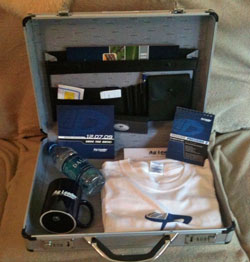
 Plant disease experts at the
Plant disease experts at the 